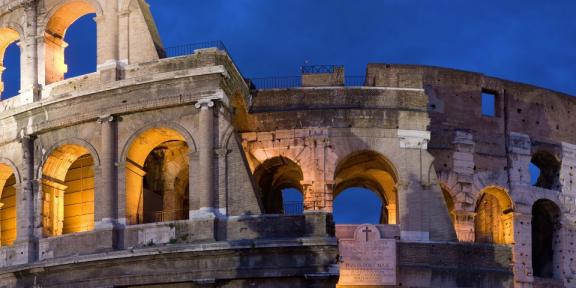All staff in Italian are committed to ensuring that teaching is consistently of the very highest quality, and that it is closely informed by their research expertise. Such expertise covers every period of Italian literature and culture alongside other scholarly fields such as linguistics, cinema, artistic, intellectual and cultural history, and it also encompasses transnational and comparative literatures. In recent years, alongside a concern to continue to teach celebrated literary figures and periods, notable efforts have been made to broaden our curriculum to women, minority and migrant writers.
A concern to combine range and diversity informs our undergraduate curriculum both for Prelims (i.e. for first-year students) and Final Honours School (second-year and finalists). At Prelims, alongside intensive language study (50% of all assessment for the degree combinations in Italian are language-based), students take courses on Italian poetry and on Modern Italy, including film and contemporary migrant writers. Students spend Year 3 abroad with guidance and support from both the Faculty and Sub-Faculty in making choices, and the Sub-Faculty currently offers some tailored teaching opportunities in Italy. At Final Honours School, once more alongside still more refined and challenging study of Italian language, the choice and intellectual and literary range is extended and enriched still further, allowing the opportunity to study Dante, medieval and Renaissance literature, the nineteenth and twentieth century and Italian cinema and a very wide range of specialist options on specific authors and themes. Notable too is the opportunity for you to write a dissertation on a topic of your choice in place of examinations.
On graduation, our undergraduates, both former beginners and non-beginners, will gain a command of grammatically precise and idiomatic spoken Italian, the ability to write accurately and idiomatically in Italian and to translate into and out of Italian with precision and sensitivity in a range of registers.
Future careers
A degree in Italian, like all degrees in Modern Languages at Oxford, is one that opens up a range of graduate opportunities. The knowledge and transferable skills of our graduates mean they are some of the most sought after in the UK and internationally. Among the careers successfully followed by students who have studied Italian are: journalism, management, law, teaching and lecturing, arts and administration, civil and diplomatic service, environmental and development work and many more.
How do I prepare for the first year at Oxford?
It is quite possible for an interested student, with some experience of language-learning, to acquire a good level of oral and written Italian before starting the course here.
Any courses you can attend beforehand (either in Britain or in Italy) will be beneficial, but the main burden of learning the language will rest with you and your own capacity for independent study.
Both for pre-university work and during your time here you will need a good grammar-book. You should choose one of the most useful recent grammars, all of which have copious exercises for you to work on each grammatical point:
- A.L. Lepschy and G. Lepschy, The Italian Language Today (especially Part II)
- A. Proudfoot & F. Cardo, Modern Italian Grammar
- M. Mezzardi, Essential Italian Grammar Practice + Answer Keys
- G. Lazzarino & A. Moneti, Da capo (3rd ed)
For Advanced students (and for subsequent years):
- M. Maiden and Cecilia Robustelli, A Reference Grammar of Modern Italian (2nd ed)
Once you have worked about half-way through the grammar of Italian, you should be able to start reading. You should start with some short stories - recent writers in this area are Buzzati, Calvino, Ginzburg, Moravia, Pavese.
The titles you will be reading in your first-year course are currently:-
- Primo Levi, Se questo è un uomo (1947)
- Natalia Ginzburg, Lessico famigliare (1963)
- Italo Calvino, Il cavaliere inesistente (1959)
- Igiaba Scego, La mia casa è dove sono (2010)
Try to read at least the first two by October; if you are a beginner, you may use translations in the first instance (If this is a Man, Family Sayings). You will also study the film I cento passi (2000; available on DVD) directed by Marco Tullio Giordana. Finally, your first-year course will have a poetry component: you will be required to study a number of Italian sonnets from Dante to the present day (we will provide you with an anthology when you arrive), plus one collection of contemporary poetry:-
- G. Ungaretti, Vita di un uomo (106 poesie) (Mondadori Oscar) - ONLY the sections 'Allegria' and 'Sentimento del tempo' (read in advance at least 'L'Allegria')
It is not essential to go to Italy before coming here, though it will help. But you can also benefit from reading Italian newspapers (the best dailies are La Repubblica, Il corriere della sera and La Stampa) or magazines (L'Espresso, Panorama, etc.), or seeing Italian films with subtitles. The dailies and magazines also have well-maintained websites: www.repubblica.it, www.corriere.it, www.lastampa.it, etc.
Buon lavoro!
